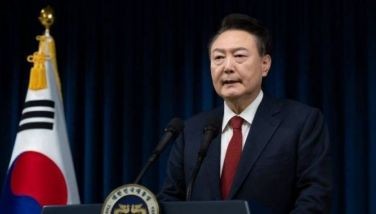US Congress sends Obama bill to aid Ukraine
WASHINGTON — Congress sent President Barack Obama a bill on Tuesday to provide $1 billion in loan guarantees to cash-poor Ukraine and punish Russia for its bold annexation of part of the former Soviet republic.
Russia's incursion into Crimea caused a deep rift between Moscow and Washington and the bill, passed with bipartisan support, was a way for Congress to denounce Russia's move and express support for Kiev.
The House voted 378 to 34 for the bill, which also is aimed at discouraging any further actions that President Vladimir Putin might be contemplating in the region.
White House press secretary Jay Carney said Obama welcomed congressional passage of the bill. He said it would help Ukraine regain economic and political footing and added that the administration supports the targeted sanctions authority provided in the legislation. "The president will continue to build support for the Ukrainian people at this critical time," Carney said in a statement.
Also on Tuesday, NATO's foreign ministers ordered an end to civilian and military cooperation with Russia and told their generals and admirals to quickly figure out ways to better protect alliance members that feel threatened by the Kremlin.
Secretary of State John Kerry and the other ministers, meeting behind closed doors at NATO headquarters in Brussels, unanimously agreed to take several steps to counter Russia, including the possible deployment and reinforcement of military assets in eastern NATO members, such as Poland and the Baltic states, which feel menaced by Moscow's latest actions. A senior U.S. defense official said the U.S. was likely to move a warship into the Black Sea and send a small team of soldiers to Europe as part of NATO's effort to bolster allies in Eastern Europe.
If Obama signs the bill into law as expected, the loan guarantees would help stabilize Ukraine's economy. The bill authorizes $50 million to improve democratic governance and rule of law and fight corruption; support fair elections; and bolster civil society organizations.
The bill authorizes an additional $100 million to beef up security cooperation among the United States, European Union and countries in central and eastern Europe and further authorizes the president to provide defense help and additional security assistance to Ukraine and other countries in the region.
Targeting Russia, the bill would supplement sanctions the Obama administration has already taken by freezing assets and revoking visas of Russian officials and their associates who are complicit in or responsible for significant corruption in Ukraine. The measure also would sanction those who are responsible for human rights abuses against anti-government protesters and the undermining of the peace and sovereignty of Ukraine.
The U.S. has warned that further Russian incursions could result in broader penalties targeting the Russian economy, including its robust energy sector. But administration officials acknowledge that American sanctions wouldn't have the same kind of bite as European penalties, given Europe's deeper economic ties with Russia.
Republican Sen. Bob Corker, a member of the Senate Foreign Relations Committee, said House passage of the Senate Ukraine bill that he co-authored allowed Congress to speak with one voice in "support of the Ukrainian people and against Russian aggression."
In separate action, the House voted 399 to 12 to pass a bill that would provide money to step up Voice of America and Radio Free Europe/Radio Liberty broadcasts to counter pro-Russian broadcasts in the area. Rep. Ed Royce, Republican chairman of the House Foreign Affairs Committee, says Moscow is using propaganda to sow confusion and fear in the Ukraine.
Royce said Russian forces have seized control of at least a dozen television and radio stations in Crimea that they now use to broadcast misleading reports that Russian speakers in Ukraine have been under attack.
"This bill puts us on the offensive in this information battle. It does so by requiring Radio Free Europe/Radio Liberty and the Voice of America to increase broadcasts to the people of eastern Ukraine and Crimea, prioritizing programming to populations that are inundated with Russian propaganda and combating the misinformation they are receiving," he said.
Ukraine, a nation of 46 million people, has been struggling to regain stability since pro-Russia President Viktor Yanukovych was ousted in February. He was booted after months of protests sparked by his decision to back away from closer relations with the European Union and turn toward Russia.
Since then, Russia has moved thousands of troops to areas near the Ukrainian border, sparking fears in the U.S. and Europe that Putin could make a play for more territory.
In Kiev, Ukraine Prime Minister Arseniy Yatsenyuk has warned his country is on the brink of economic and financial bankruptcy. Ukraine's Finance Ministry has said it needs $35 billion over the next two years to avoid default.
The International Monetary Fund last week pledged up to $18 billion in loans, hinged on structural reforms. The reforms demanded by the IMF, which include raising taxes, freezing the minimum wage and hiking energy prices, will hit households hard and are likely to strain the interim government's tenuous hold on power. Other donors, including the European Union and Japan, have already pledged further aid to Ukraine. The total amount of international assistance will be about $27 billion over the next two years.
Steven Pifer, a former U.S. ambassador to Ukraine who is now an analyst at the Brookings Institution think tank in Washington, said the Ukrainian economy is in deep trouble, and every $1 billion will help.
The IMF program, which will total $14 billion to $18 billion over two years, will be distributed in tranches as Ukraine implements reforms, he said. The IMF board still needs to approve the money, so "the U.S. loan guarantees will help Kiev bridge the time from now until the IMF funding begins to flow," Pifer said.
Ariel Cohen, an expert on Russian and Eurasian affairs at the Heritage Foundation in Washington, said the $1 billion the U.S. is providing in loan guarantees, coupled with the IMF and EU pledges, is a start to help Ukraine.
"But it doesn't resolve the problem, which is that Ukraine does not generate enough growth and income to plug the budgetary holes created by energy dependence on Russia," Cohen said.
On Tuesday, Moscow sharply increased the price for natural gas to Ukraine and threatened to reclaim billions in previous discounts, raising the heat on its cash-strapped government.
- Latest
- Trending






























